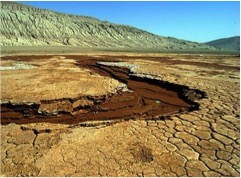 The beginning of the good news of Jesus Christ, the Son of God.
The beginning of the good news of Jesus Christ, the Son of God.
As it is written in the prophet Isaiah,
“See, I am sending my messenger ahead of you,
who will prepare your way;
the voice of one crying out in the wilderness:
‘Prepare the way of the Lord,
make his paths straight,’” (Mark 1:1-3, NRSV).
“The beginning” did you hear those words? Something’s about to start here. Listen for it. What are we beginning? “The good news of Jesus Christ, the Son of God.” No genealogy or baby in a manger in Mark. Mark is ready to lay out the conclusion you will surely come to if you keep reading. Mark is already in the middle of a conversation and expects that we’ll keep up.
He starts with Isaiah, which is a bit like starting a story about a political candidate with a line from the national anthem. Mark selects his passage with care: he does not start in the first stanza with that familiar line “Comfort, O comfort my people.” He is not interested in comfort. Comfort doesn’t call for a messiah. We’re starting somewhere else – at the beginning.
“See,” it says, and all good prophets start with that same word. Look. Look! Do you see what God is doing? Can you use your eyes and notice? Whether or not it’s obvious to you—or even perceptible—God is moving. “See… I am sending my messenger ahead of you, who will prepare your way. The voice of one crying out in the wilderness.” The wilderness, though, is not the tidy, legally protected vestige of another world set aside for our enjoyment. It is a place abandoned or ravaged, a place where no people want to go, or a place, perhaps, where no people are left. It is cleared out. Emptied. It is what lies ahead on our paths. The beginning of the good news.
 This voice cries out, Isaiah says. Cries out for help, to be noticed, because all other resources are exhausted. There is nothing left but to plead with God. This is the messenger who has gone on ahead. This is the path, the way that is being prepared. A voice, crying out in the wilderness. The beginning of the good news.
This voice cries out, Isaiah says. Cries out for help, to be noticed, because all other resources are exhausted. There is nothing left but to plead with God. This is the messenger who has gone on ahead. This is the path, the way that is being prepared. A voice, crying out in the wilderness. The beginning of the good news.
Isaiah’s crying voice sets the stage for a poetic vision that is both terrifying and wonderful, a flowing, paradoxical description of what God intends for Israel, of what it may mean to enter into covenant with a loving God who is fiercely devoted to justice and equity. The voice cries out to prepare the way, to make a straight path. As Isaiah says: the mountains will be brought down, the valleys will be raised up, the rough places will be smoothed over. This is the beginning.
Isaiah—the prophet, the tribal poet—never thought in English. These words that we hear: mountains, valleys, straight, smooth; they have poetry in them, an abundance of meaning. In Hebrew, a mountain evokes something similar to what we’re accustomed: a high, inaccessible place of much beauty and danger. In English, we might call a series of difficult circumstances a ‘rough patch,’ but Isaiah has a different set of tools: a rough place is a deceiver, and smoothing it over makes it righteous. The crying voice in the abandoned place is not simply seeking an easy level path for God to walk on. “Prepare,” it says, and the Hebrew implies something akin to repentance: clear away what blocks you – turn and look. It’s about to begin. A voice crying in the wilderness.
Those mountains in the distance, the high places of self-discovery, kindness, generosity, love: they have been so beautiful to keep in the distance, high, inspiring and really hard to get to. The way of the Lord requires they be not just brought low – the English only begins to hint at the abasement intended here. Likewise, the valleys, the places where we run and hide, where we feel protected because we are unseen, they will be brought up, meaning: forgiven, carried, dignified. The beginning.
When Mark starts this gospel with Isaiah’s words, he intends the reader to call to mind the whole. But he stops so short! Make the paths straight. Straight, a word we all know. Straight as an arrow. Straighten up. Set the record straight. Mark loves this Greek word, euthys. It’s all over his gospel. Here it shows us a Jesus who moves with lightning speed from one episode to another. He goes straight to this and straight to that. The translation to English is ‘immediately.’ Mark sets a tone here. A voice crying in the wilderness. The beginning: immediately. God’s already started.
So what is God up to? What’s this great big good news Mark wants us to know? God’s up to something big, and it’s happening now. What Mark wants us to know is, are you ready? If you’re still holding on to the noise of your life, if your days are cluttered with the kind of busy that pleasantly distracts you from the fact that you’re always tripping over your own spiritual furniture, then you’re about to miss what God is beginning right in your midst. There is a voice, crying out in the wilderness.
That thing that God is beginning – it’s what God is always doing, right from the start. Right to the end. God is calling. God is creating with words a reality in which we can, if we so choose, be free to live every moment unencumbered by the mistakes and wounds of the past, free enough to let the love that makes up every molecule of the universe flow through our lives and bring us blessing, bring blessing to those around us, and heal the world. That’s what God is up to. that voice crying in the wilderness knows full well that God is leading us to a place of comfort, to a place of joy and fulfillment, but until we get there it will feel like the valley of the shadow of death. Because there is pain and wounds. We have made mistakes. It’s not so easy to let go of those. What’s worse: there will be more. So we build our mountains because we know we’ll never be those shining beautiful virtues. We dredge out our valleys so we can go and hide and feel safe from the piercing gaze of the one who knows what glory is really hidden inside each of us. Do you hear the voice?
 Your wilderness is calling. That uncluttered space of your deepest self, far below the protective scabs and defensive armor that life piles on all of us. There is a voice there, a desperate one with nothing left but to cry out. What keeps us from hearing? A therapist I know once compared anxiety to the static on a radio station: when there’s too much, even what little we can hear is wildly distorted. Maybe you have anxiety. Maybe the holidays leave you on edge, your body remembering times past when this season was associated with unhappy memories. Maybe the money is tight. Every price tag and sales pitch feels like an assault. Are the days at work or nights at home so exhausting that any distraction is worth the price? Can you turn the noise down for a moment and listen? Can you find your way into that empty space, and join in the preparation?
Your wilderness is calling. That uncluttered space of your deepest self, far below the protective scabs and defensive armor that life piles on all of us. There is a voice there, a desperate one with nothing left but to cry out. What keeps us from hearing? A therapist I know once compared anxiety to the static on a radio station: when there’s too much, even what little we can hear is wildly distorted. Maybe you have anxiety. Maybe the holidays leave you on edge, your body remembering times past when this season was associated with unhappy memories. Maybe the money is tight. Every price tag and sales pitch feels like an assault. Are the days at work or nights at home so exhausting that any distraction is worth the price? Can you turn the noise down for a moment and listen? Can you find your way into that empty space, and join in the preparation?
Mark’s gospel doesn’t have the kind of Christmas we’re accustomed to. We have to sneak over to Luke and Matthew for a stable, animals, wise men and shepherds. Mark takes us somewhere different. Before we can see that little baby, that tiny insignificant event that will shake the cosmos, we have to clear out space, knock down mountains and fill in valleys, turn down the volume of life and just listen. There is a voice there, crying out. Prepare. Make way. God is about to do something. The beginning.
Michael serves as a priest at St. Mark’s Episcopal Cathedral in Seattle. When not creating kitchen chaos in his quest for gastronomic bliss, he enjoys spending time in nature with his wife and two young children. He is co-author of Boats Without Oars: Ancient-Future Evangelism, An American Road Trip and Collected Stories from the Episcopal Church. More of his writing may be found at www.carroccinocollective.com.
